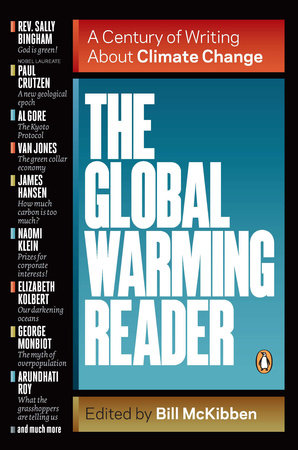Climate Change Reading List
As we near the beginning of the Fall 2018 semester, I wanted to share steadily growing Climate Change Reading List. No fiction this time, but rather a mix of books that I've come across, or that have been recommended to me, from various disciplines. For those of you looking to learn a bit more about our climate and its global effects--enjoy!







The Global Warming Reader, Bill McKibben (editor)

For those who want to learn more about the history of climate change (both as a phenomenon and as a field of study), this is a great place to start. The anthology includes excerpts from many leading figures in both the academic and popular discourses on climate change, as well as landmark historical publications in the observation of global warming.
The End of Nature, Bill McKibben

McKibben's book on global warming, credited with bringing knowledge of climate change to a broader public audience. Published in 1989, he portrays the gradual erosion of the boundary between humanity and nature (if such a boundary ever existed), and how nature has become irrevocably and monumentally changed by human existence.
Ecovillages, Karen T. Litfin

Litfin is a political scientist who spent a great deal of time frequenting real ecovillages and studying their methods and values for maintaining sustainable communities. She addresses difficult questions regarding the implementation of sustainable lifestyles, particularly implementation on a global scale: "How do we scale it up?" she was once asked by a political economist. A good question, she admits--and a necessary one. Litfin explores the possibilities for living "within nature's capacity of self-replenishment."
Drawdown: The Most Comprehensive Plan Ever Proposed to Reverse Global Warming, edited by Paul Hawken

This is a big one. Not in terms of actual size necessarily (although it is a big and colorful book), but in terms of scope and vision. Hawken brings together data and statistics collected by climatologists, environmentalists, and public policy experts in order to examine potential plans for redressing global warming. "Drawdown" refers to a point in time at which greenhouse gases in the atmosphere begin to decline on a steady basis. We're already implementing some of the plans discussed in this book, but how can we do more? Drawdown has an impressive perspective, and one that demands complexity and the recombination of already-existing policies and programs.
The Metamorphosis of the World, Ulrich Beck

This one is a bit of an outlier. Not written by a climatologist or environmental scientist, nor about climate change specifically, Metamorphosis is a work of social theory that examines how modern sociology and critical theory are at a disadvantage when assessing contemporary global problems, and how academics can overcome this disadvantage. Beck is mainly interested in complexity and the difficulty in studying it: "the metamorphosis of the world is taking place in seconds," he writes, "with a speed that is nothing short of inconceivable, and as a result it is overrunning and overwhelming not just people but institutions." One key point of Beck's analysis is that many widespread and detrimental conditions of global modernity (including climate change) are not anomalous side effects of industrialized social progress, as has often been claimed, but are in fact endemic and central to progress. A difficult read (made more difficult by the fact that Beck died before completing it), but provocative nonetheless.
Molecular Red: Theory for the Anthropocene, McKenzie Wark

Half Marxist political treatise, half ecological history, half science-fiction theory... that math doesn't add up, but no matter. Wark's book packs in a lot, so it feels like more than just two halves. I'll say that for those interested in Marxism, Wark presents a compelling account of the crossover between revolutionary politics and science fiction through the figure of Alexander Bogdanov and his work of utopian sci-fi, Red Star. For those less interested in Marxism, the book still presents a fascinating history of the intersections between World War II military science and the emergence of climatology, as well as the consequences of this history for contemporary sci-fi, namely the work of Kim Stanley Robinson. Overall, an enlightening book about the ways that the stratification of knowledge relates to the stratification of earth and technology in the Anthropocene.
Environment: An Interdisciplinary Anthology, edited by Adelson, Engell, Ranalli, and Van Anglen

Finally, this anthology, which includes excerpts from publications across the fields of science and the humanities. One of the central issues of this book isn't simply climate change or global warming, but what constitutes an environment. How do we imagine or conceive the world for a tree, or a polar bear? What does it mean to be part of an environment beyond seeing the world as for us? Environment is a book that circles through the enmeshed networks of animal, vegetable, and microscopic systems, all the while asking readers the difficult question: where do we fit in? The book may not contain the answer, but the readings contained herein will provoke you in ways you probably haven't considered.

Comments
Post a Comment